
Singapore: Powering Progress Together 2018
Themed “Energy for Better Living”, this forum discussed ideas to help the world transition to a low-carbon future.
Read more about Powering Progress Together 2018
Continuing the dialogues from 2017 and 2018, Powering Progress Together 2019 discussed how we can co-create the future of cities.
By the year 2050, the world’s population could grow from the current estimated 7.7 billion people to 9.7 billion, and around 70% are expected to live in cities. Even with a huge improvement in energy efficiency, the world is likely to be using 50% more energy by 2070, compared to today.
To meet this rising demand, society will need to make fundamental changes in how energy is produced and consumed, while reducing impact to the environment. This will also require unprecedented collaboration between policy-makers, industry, civil society, and consumers across the global economy.
This year, themed “Co-creating City+”, the 2019 Shell Powering Progress Together forum in Singapore explored how different players can come together to co-create, collaborate and re-imagine the future of cities, to build what we call ‘City+’.
Shell’s “Living Lab” approach – innovating in actual living environments
At this year’s event graced by Guest-of-Honour, Senior Minister and Coordinating Minister for National Security Teo Chee Hean, Shell launched its first global City Solutions Living Lab in Singapore to help cities around the world navigate their energy transition towards a lower carbon future.
General Manager of Shell City Solutions, Emily Tan, said, “When collaborating with cities, we take a holistic view of their unique needs. The City Solutions Living Lab will originate opportunities with city stakeholders through co-visioning workshops that identify pathways towards a lower carbon future. We then innovate a suite of solutions with commercially viable business models that help meet the city’s carbon reduction goals. Our team will bring in various Shell expertise available globally for seamless implementation and deployment. We can also offer unique access to an extensive network of technology partners, suppliers and contractors.”
Clean energy case studies in Singapore and the region
Shell chose to base its first City Solutions Living Lab in Singapore due to the city-state’s active push for energy transition and sustainability, its pro-business environment and Shell’s presence in Singapore.
“Shell and Singapore have had a long history of working together, in building businesses that create sustained and meaningful value. Not only are our assets in Singapore being used as live test beds to pilot new technologies, the larger Singapore ecosystem also enables Shell to push innovative thinking even further. Energy solutions that we develop successfully here can potentially be replicated in cities around the world,” said Aw Kah Peng, Chairman, Shell Companies in Singapore.
“I am delighted that Shell has chosen Singapore to be the location for its first City Solutions Living Lab. Shell’s decision to develop new energy solutions in Singapore is in line with our focus on energy sustainability and reducing carbon emissions. We intend to work with Shell, and other like-minded companies, to address the needs of countries in the region and beyond in their transition to become low carbon economies,” said Dr Beh Swan Gin, Chairman, Singapore Economic Development Board.
To date, Shell has worked with city officials, think-tanks, private industry players and community leaders in cities such as Singapore, Chennai (India) and Perth (Australia). With the launch of the Living Lab, Shell can now offer its collaboration architecture to more cities.
In Singapore, Shell City Solutions has worked with PSA Singapore to understand the energy needs of the Pasir Panjang Terminal and the future Tuas Port. Together, Shell and PSA identified opportunities for carbon reduction such as switching to cleaner fuel options and the study of a near net-zero energy building.
Shell has also signed a Memorandum of Understanding with the Energy Market Authority of Singapore (EMA) to jointly work on spurring the adoption of energy storage systems (ESS). This will be achieved through piloting use cases and designing effective business models. Increased ESS adoption will support the deployment of more solar photovoltaic in Singapore.
Students imagine the future of Asian and Middle Eastern cities
Beyond these efforts, Shell also engages youths through its Imagine the Future Scenarios Competition, which is part of the highlights at PPT, to discuss the energy possibilities of tomorrow in Asian and Middle Eastern cities.
This year, a total of 237 university students and more than 40 teams from across Singapore, China, Thailand and Egypt took part in the competition. The winning national teams from each country shared their contrasting visions of future Asian and Middle Eastern cities by 2050 at this year’s PPT Forum, and first place went to the University of Science and Technology in Zewail City, Egypt.
Powering Progress Together (PPT) is a global series of engagements convened by Shell to encourage dialogue about future energy challenges.
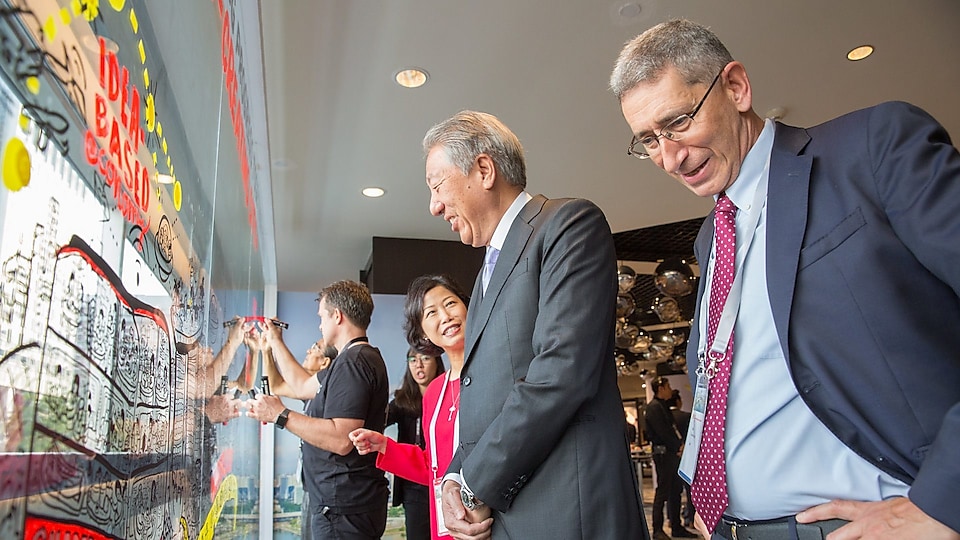
Senior Minister and Coordinating Minister for National Security Teo Chee Hean exchanging views on the future of sustainable cities with Aw Kah Peng, Chairman, Shell Companies in Singapore and Executive Vice President of Shell New Energies, Mark Gainsborough at the Shell Powering Progress Together Forum.
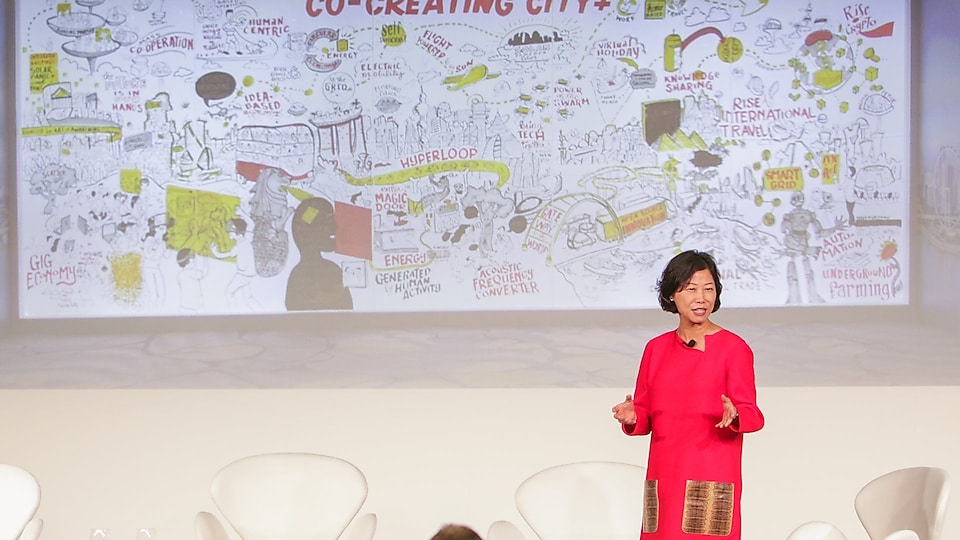
Aw Kah Peng, Chariman Shell Companies in Singapore opening Powering Progress Together 2019
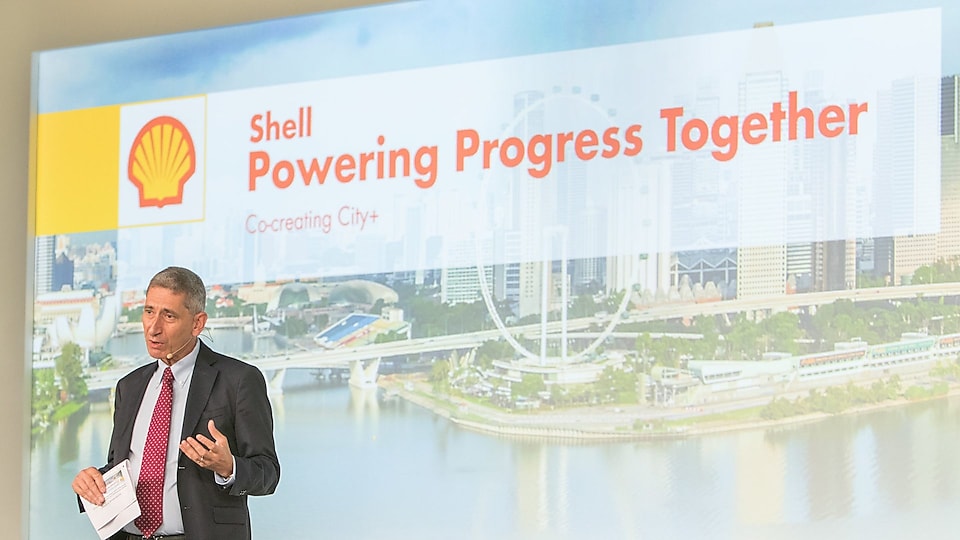
Executive Vice President of Shell New Energies, Mark Gainsborough, announcing Shell’s new global initiative the City Solutions Living Lab, at the Shell Powering Progress Together Forum.
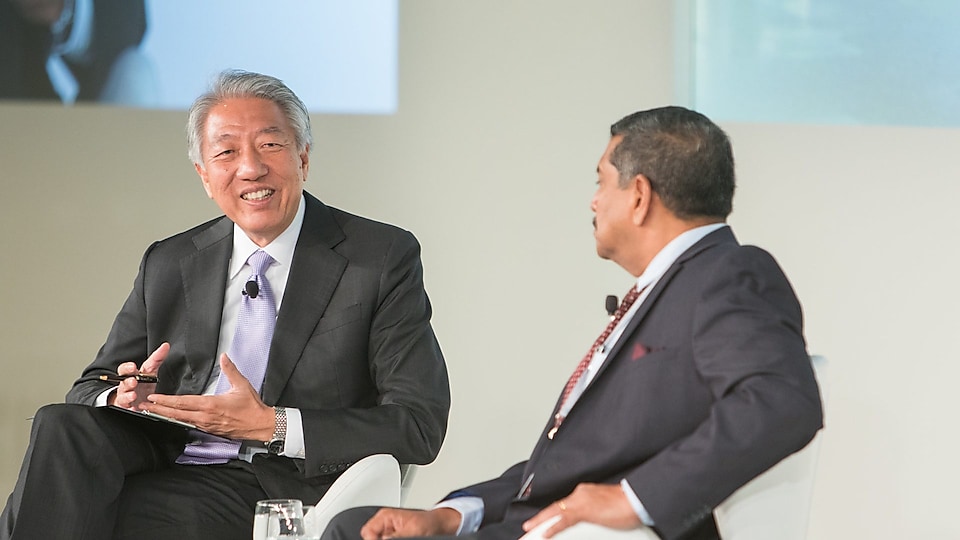
Senior Minister and Coordinating Minister for National Security Teo Chee Hean discussing Singapore’s efforts towards a low-carbon future with delegates at the Shell Powering Progress Together Forum.
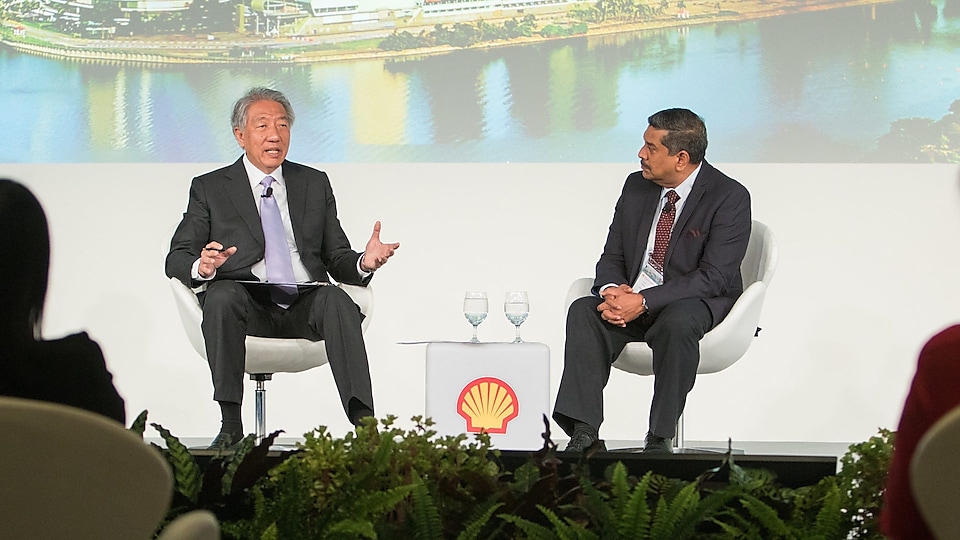
Senior Minister and Coordinating Minister for National Security Teo Chee Hean discussing Singapore’s efforts towards a low-carbon future with delegates at the Shell Powering Progress Together Forum.
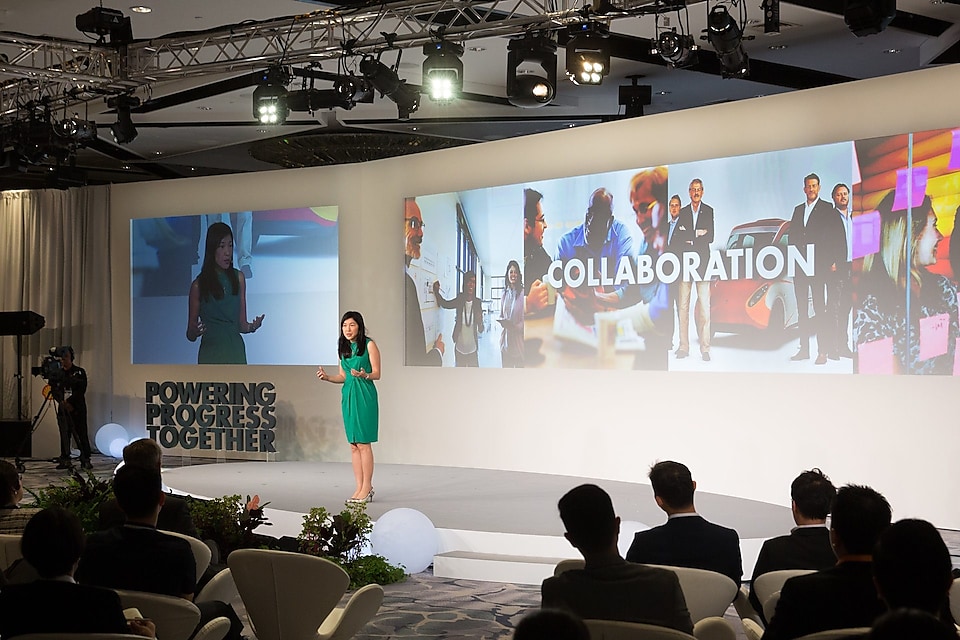
Emily Tan, General Manager, City Solutions, Shell, introducing Shell’s new global City Solutions Living Lab which aims to enable collaboration between various city stakeholders to identify pathways towards a lower carbon future.
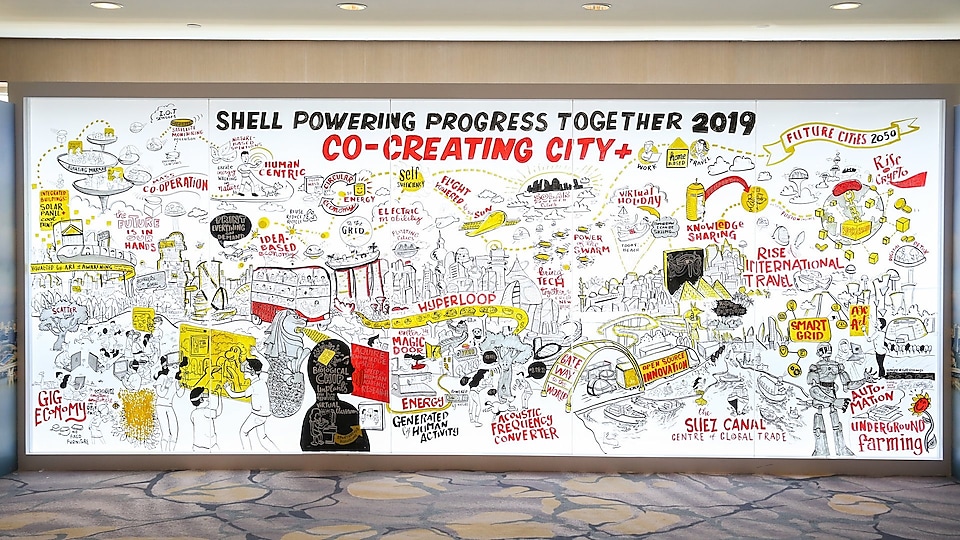
A mosaic of what you will find in sustainable cities in the future based on scenarios developed by the Imagine the Future Scenarios Competition teams and ideas from attendees at Powering Progress Together 2019.
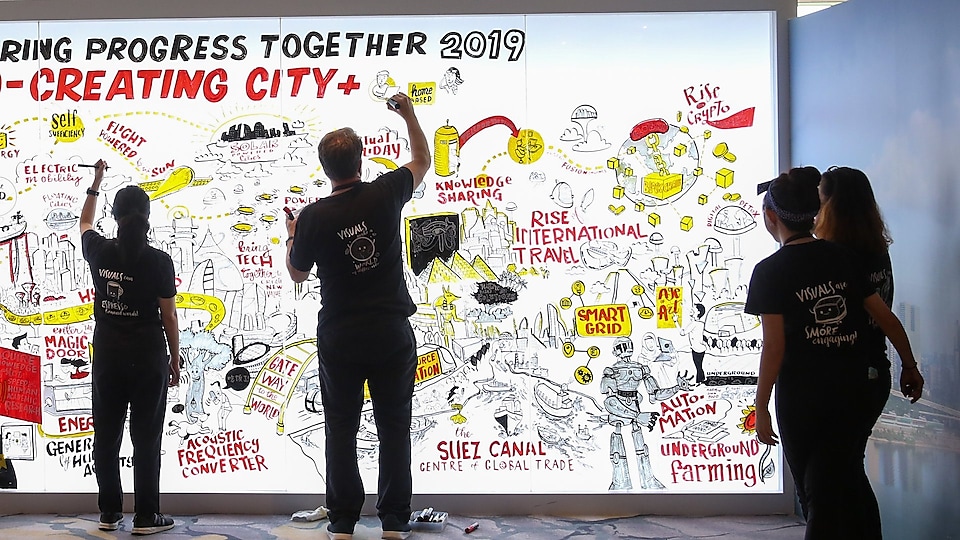
Artists working on the Co-creating City+ mural live at Powering Progress Together 2019.
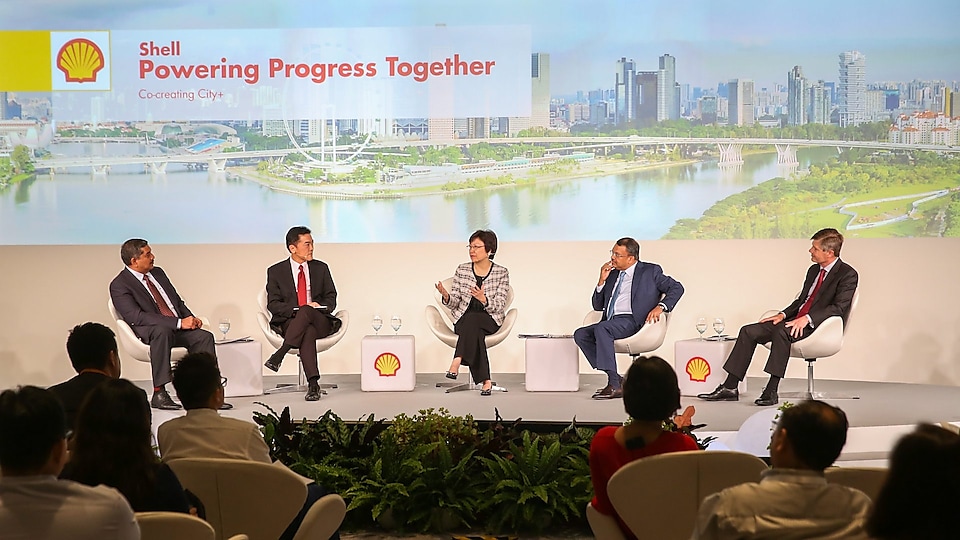
Panel discussion on the topic of “Sustainable Cities: Future-Ready vs Today’s Needs” included business and government leaders (from right to left): Ong Kim Pong, Regional CEO, Southeast Asia, PSA Singapore, Dr Cheong Koon Hean, CEO, Housing & Development Board (HDB), Sunny Verghese, Chair, World Business Council for Sustainable Development and Brian Davis, Vice President, Energy Solutions, Shell
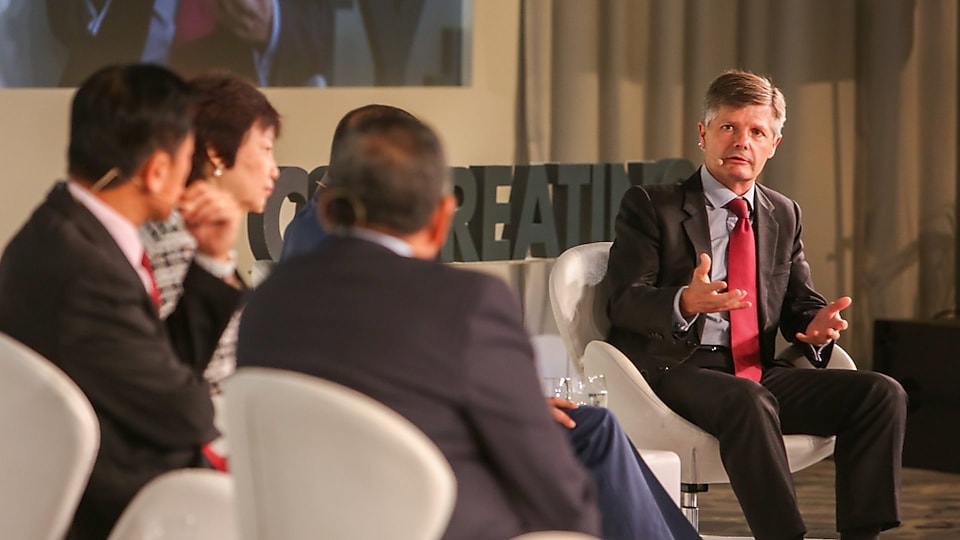
VP, Energy Solutions, New Energies, Brian Davis on the panel
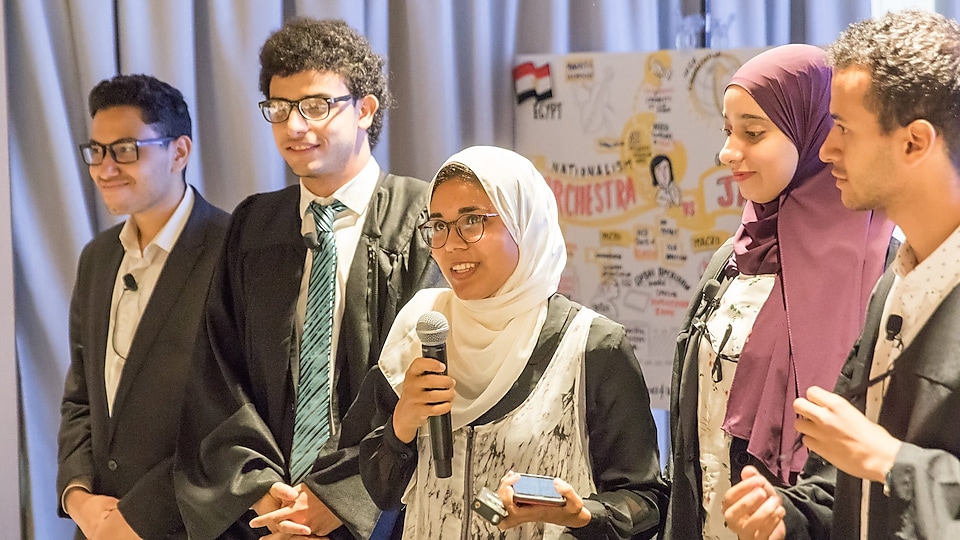
The Egypt national team from the University of Science and Technology in Zewail City came in first at the Imagine the Future Scenarios Competition 2019. They presented their scenarios of the way people live, work and play in 2050 at Shell Powering Progress Together Forum.
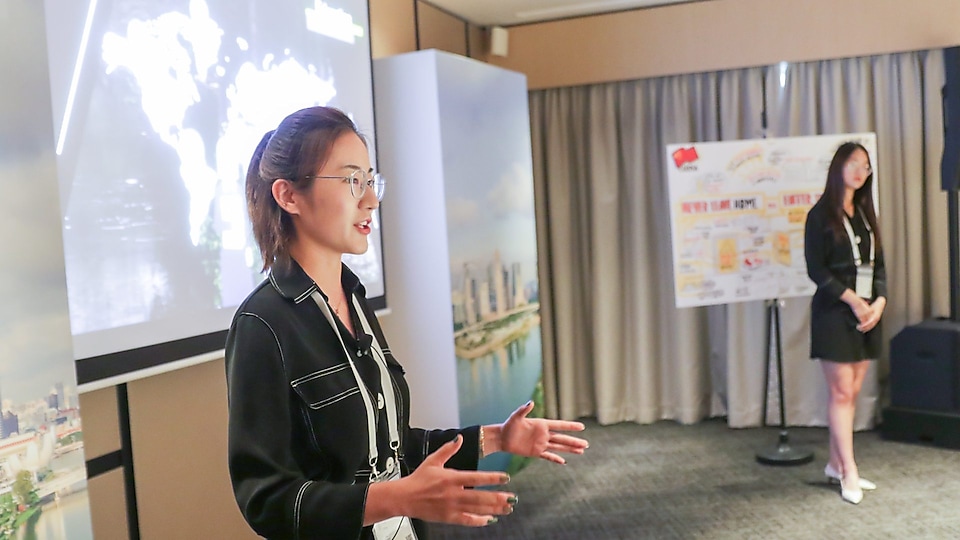
The China national team from Sino British College USST sharing their scenarios of two possible futures at the Powering Progress Together Forum.
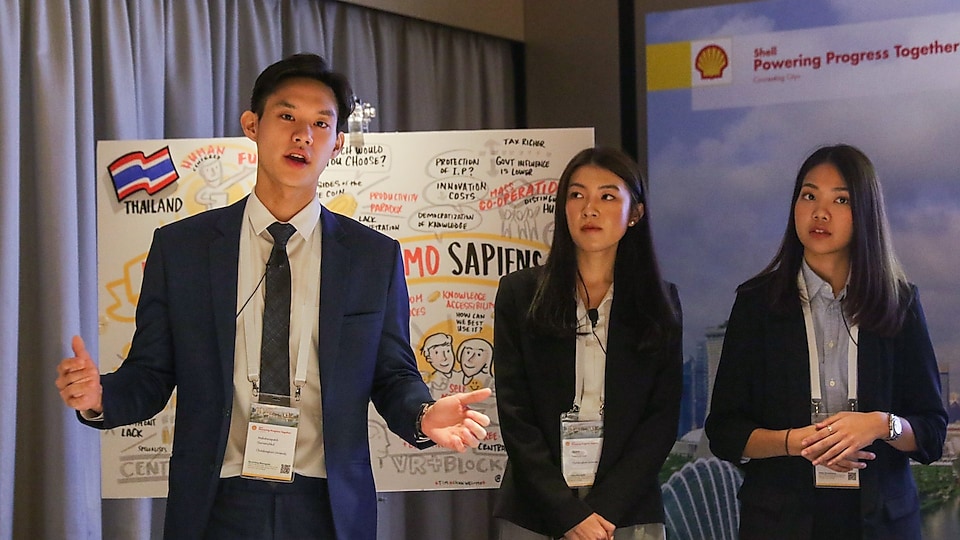
The Thai national team from Chulalongkorn University sharing their scenarios of two possible futures at the Powering Progress Together Forum.
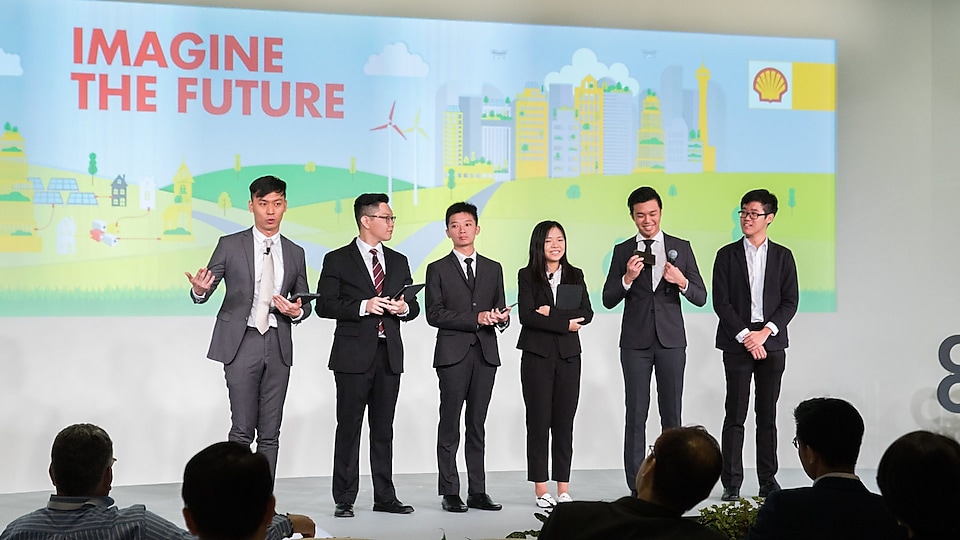
The Singapore national team from Nanyang Technological University sharing their scenarios of two possible futures at the Powering Progress Together Forum.
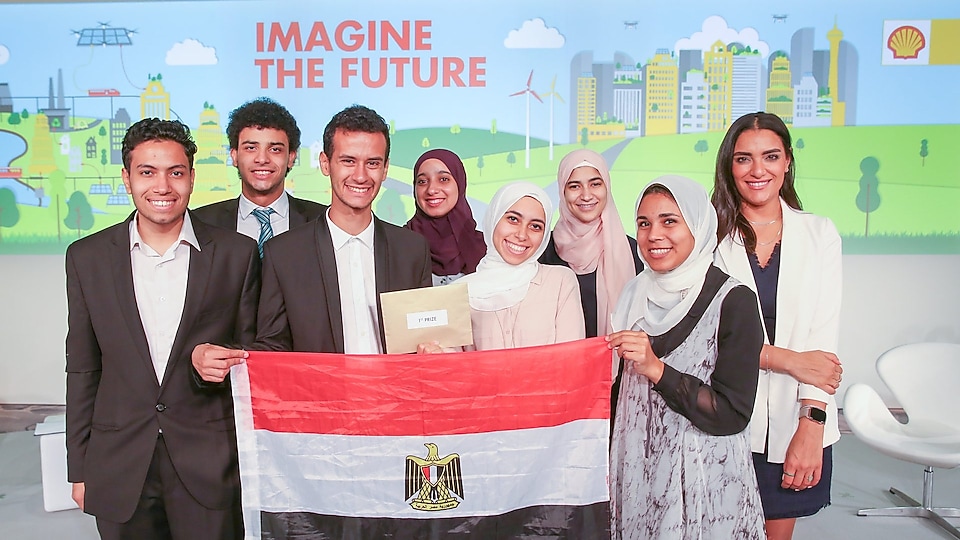
The champion of Imagine the Future Scenarios Competition 2019 is the team Egypt’s University of Science and Technology in Zewain City.
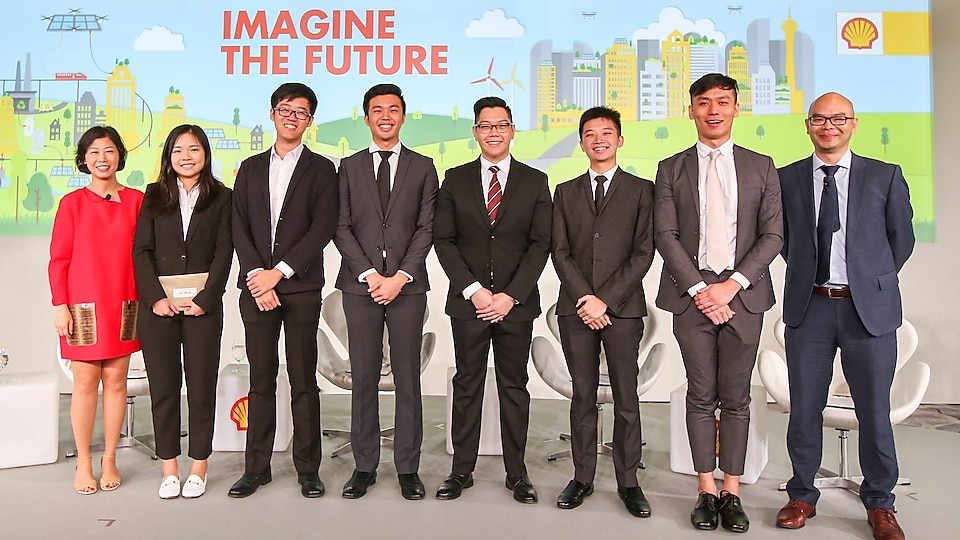
1st Runner-up for the Imagine the Future Scenarios Competition 2019 is the team from the Renaissance Engineering Programme at Nanyang Technological university. (From left) Posing with the team are Aw Kah Peng, Chairman, Shell Companies in Singapore and Chief Judge of the competition, Dr Valery Chow.
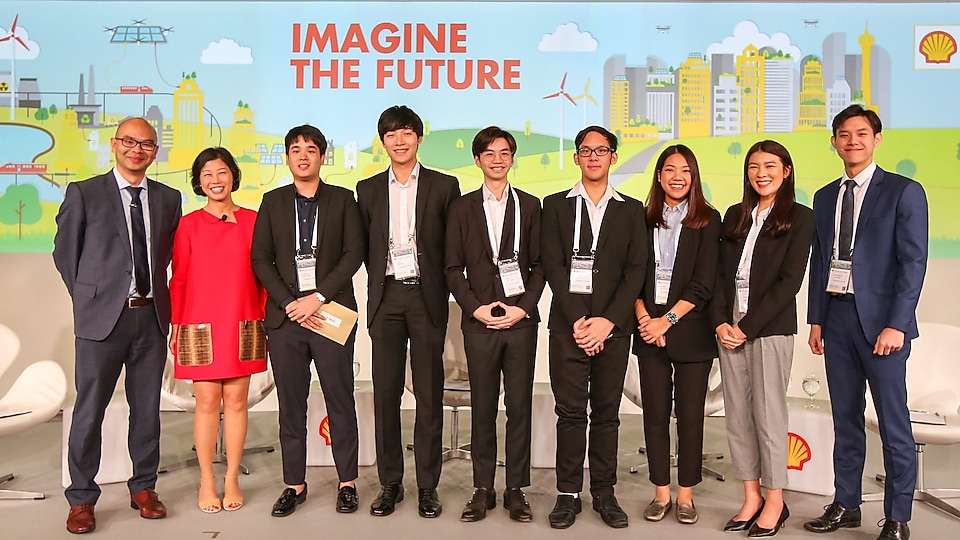
2nd Runner-up for the Imagine the Future Scenarios Competition 2019 is the team from Thailand’s Chulalongkorn Univerisity. (From left) Posing with the team are Chief Judge of the competition, Dr Valery Chow and Aw Kah Peng, Chairman, Shell Companies in Singapore.

Themed “Energy for Better Living”, this forum discussed ideas to help the world transition to a low-carbon future.
Read more about Powering Progress Together 2018
Scenarios provide plausible alternative views of the future. Building and using scenarios can help us explore what the future might look like and the likely changes of living in it. Join the Imagine the Future competition and shape the way we live, work and play!
Imagine the Future Competition
Themed “Cleaner Energy Moves Asia”, this inaugural launch in Singapore discussed the dilemma of how to provide clean energy as Asian economies grow and their demand for energy increases.
Singapore: Cleaner Energy Moves Asia